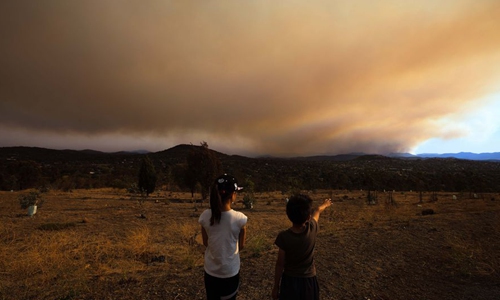HOME >> SOURCE
Australia’s tourism sector set to take hit from coronavirus
Source:Global Times Published: 2020/2/13 21:57:54

Photo taken on Feb. 3, 2020 shows smoke from the bushfire burning in the south of the Australian Capital Territory (ACT) moves to blanket the Australian capital Canberra. (Photo by Chu Chen/Xinhua)
The Australian government on Thursday decided on an extension of its China travel ban, one day after Japan's expansion of its ban on travelers from China, in what could be a negative domino effect on the tourism sector at large, industry veterans said.
Australia, for its part, might see tourism, a fast-growing part of its economy, lose steam as China, the top inbound tourism source for Australia, is expected to experience a pause in travel activity due to the outbreak of the novel coronavirus.
Australia's National Security Committee met on Thursday and decided to extend a previously announced 14-day coronavirus ban that is set to expire on Saturday for an additional week. The new ban would be reviewed again before its expiration.
The decision came after Japan announced an expansion of its ban for passengers and passport holders of East China's Zhejiang Province. The ban previously covered only Central China's Hubei Province, the epicenter of the virus.
With concerns lingering over when the virus might genuinely peak before subsiding and how effective the economy would be in tackling the downward pressure from the viral onslaught, the tourism sector could be among the hardest-hit and the slowest to rebound, said Zhang Lingyun, a professor at Beijing International Studies University.
"Unlike the retail, education and other sectors that could see part of the impact offset by a shift toward deals made online, the tourism sector is almost all about the physical experience," Zhang, a tourism expert, told the Global Times.
The May Day holiday that is supposed to be extended into five days this year as part of efforts to spur consumption might be canceled, as fears of the virus could persist until then, he said, noting that the extended Spring Festival holiday and delayed restart of production and work are likely to cut back on holiday plans.
The downward pressure on the economy, especially the job market, would also put a damper on consumption, delaying or killing travel plans, especially outbound travel intentions, industry watchers said.
Both the domestic and international tourism markets would take a hit from the virus, Song Ding, a research fellow at the Shenzhen-based China Development Institute, told the Global Times on Thursday.
He forecast that a turnaround would be likely in the third quarter, especially during the National Day holiday in October.
On the part of Australia, with China as its largest source of international travelers, the uncertainty resulting from the virus could mean Australia's tourism sector — which grows much faster than its national economy — could be losing steam, analysts said.
In the year ended September 2019, international travelers from the Chinese mainland went up 1.2 percent year-on-year to 1.3 million while their expenditure rose by 6.8 percent to A$12.3 billion ($8.28 billion), according to data from Tourism Research Australia (TRA).
That represents nearly 15 percent of all international visitors to Australia during the period and over 27 percent of all spending by foreign travelers, according to the TRA numbers. In a worst-case scenario, this could mean hefty losses to Australia's tourism sector, which clocked 7 percent growth in the financial year 2017-18 versus the nation's real GDP growth of 2.9 percent.